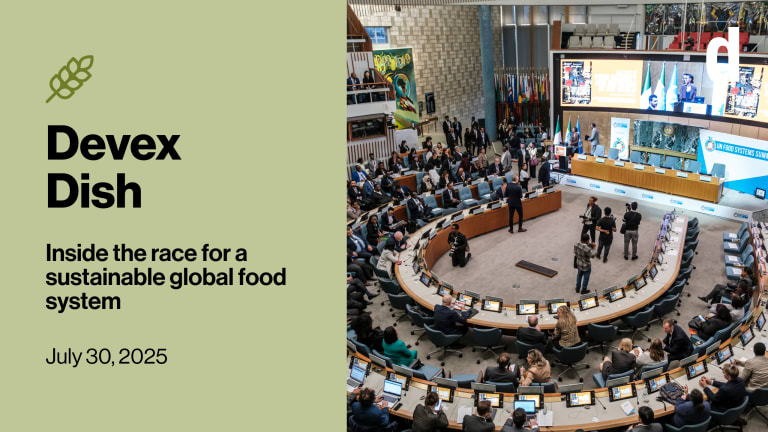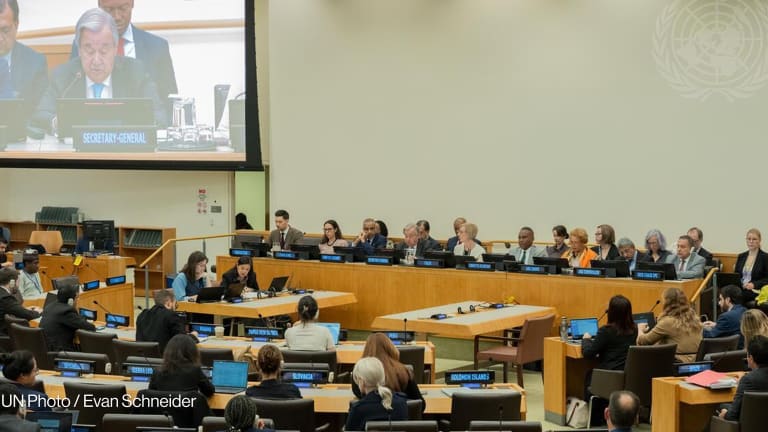
NEW YORK — A “demonization” of refugees is threatening the International Rescue Committee’s basic mission and existence, suddenly placing them “on the defensive,” said IRC president and chief executive officer David Miliband in an interview with Devex.
This tightening shift in political tone and policy from the United States and Europe has practical effects on country offices, but also presents an urgency to the basic workings of the International Rescue Committee, which reached 26 million people in 2016, with international programs that totaled about $570 million.
“Suddenly, we’re on the defensive,” to back the basic premise of refugees, a bedrock of America’s beginnings, Miliband says.
“That’s very striking. It prompts some people to want to support us, which is good, but it also creates a climate in which our clients are more afraid, [in] which our staff are more afraid,” Miliband said in a recent interview in his New York office.
“And so the big question is not just a one year question, or a four year question. The very existence of the [IRC’s] program is under question and so it's part of our job is to raise the alarm about what's happening.”
See more Devex coverage of the refugee crisis:
► Q&A: Italian Red Cross president on community outreach to combat xenophobia
► Debating the rules: What in-house refugee costs count as aid?
► Opinion: The European refugee crisis is a communications disaster. Here's why.
Miliband, the former foreign secretary of the United Kingdom, sounds this alarm in his new book, “Rescue: Refugees and the Political Crisis of Our Time,” published late last year. The quick 120-pages read almost like the text of a pointed political speech. In it, Miliband articulates an argument that is commonplace in the development and humanitarian world, though his points seem especially charged in today’s political climate.
Governments should care about refugees because of a moral imperative, but it’s also a smart strategic move, he says.
“The greatest danger for the refugee populations is the mismanagement or under management of their needs, because they're seen as someone else's problem. It is not just a refugee issue. It's a climate issue, it's a global health issue, in some ways, it's a global security issue,” he said.
“The multilateral systems is imperfect, but not half as imperfect as not having a multilateral system. And that's the big danger at the moment, that the global commons of which refugees are some parts of the constituency. It's under-managed, mismanaged, weakly managed, dividedly managed.”
There are 22.5 million refugees, more than half of whom originate from three countries: Afghanistan, Syria, and South Sudan. The vast majority of these refugees head for other low- and middle-income countries, with the top ten refugee-hosting countries accounting for 2.5 percent of global income, as Miliband writes in “Rescue.”
The Trump administration’s controversial travel ban first signed in early 2017 was accompanied by a cap on how many refugees can enter the U.S., home to the largest formal refugee resettlement program. This September, the Trump administration announced it would maintain the cap, from 110,000 to 45,000 refugees, for the financial year 2018.
Current flow rates could place numbers of arriving refugees closer to 15,000, Miliband says. Far fewer refugees entering the U.S. — where the IRC is headquartered and also works with resettled refugees — has also calmed caseworkers’ workflow, in some cases. It’s also derailed plans of expectant refugees.
“There are huge numbers of Iraqis who registered for special immigrant visa status of some kind, who were are all the way through the process and are now being told they can't come back because of the travel ban,” he said. “We've had clients who were anticipating they won't be able to come who are now in limbo. That was especially the case in the beginning of the year. It's putting a lot of strain on the system, really.”
Heavy flows of refugees into Europe in the last several years from Syria, Afghanistan, Iraq and other countries have prompted both reconsiderations of whether to admit, and how to handle, the influx of people, even as the arrivals slowed in 2017. The sudden new visibility of foreigners has been met with some backlash and waves of xenophobia, from the U.S. to the U.K. to Germany, which both turned to leaders and political breaks in 2016 that emphasize isolationist ideals.
“That’s where we’ve fallen down in the last 10 or 15 years, is not having refugees speaking as refugees.”
— David Miliband, president and CEO of the IRCMiliband took on the job leading 15,000 IRC staff and 10,000 volunteers in April 2013. A newbie to international development and humanitarian affairs, the former British Labour Party politician had another unique point on his resume: His parents were both Jewish refugees during World War Two.
Miliband looks to his personal background to open his book — “The first refugees I ever met were my parents,” he writes. He offered this window into his life to make the book “more interesting than a policy primer on the refugee crisis.”
It was also one of the three reasons he gave during his job interview for IRC president and CEO.
“There were three reasons I wanted to lead the IRC — one was that these were some of the issues we were finding most difficult in public policy, secondly that the IRC was a bit of a sleeping giant, and thirdly that my parents were refugees,” he said.
His background surprised his staff during a first introductory speech, and continues to confound refugees he meets in his day-to-day.
“Well, they are very surprised when they see this person. I'm not necessarily wearing a suit when I go and meet them, but it looks like this Western person … and sometimes I'll say, 'Oh, well actually, my parents were refugees,' and they are like, 'Oh, well.' So it does. I think it does have an impact,” Miliband said.
Having real people talk about their own experiences, in their own words, is “what’s missing,” and is one of the ways Miliband thinks the IRC can dispel the negative rhetoric that can sometimes now accompany the word “refugee.”
“That’s where we’ve fallen down in the last 10 or 15 years, is not having refugees speaking as refugees,” he said.
Another problem the IRC is working to break is thinking about refugee flows and needs as a short-term problem.
A $100 million MacArthur Foundation award was granted to the IRC and Sesame Street in December — in form of a bespoke Arabic-language Sesame Street show, home visits, and childhood development centers targeting more than 9 million kids facing “toxic stress.” The program intends to “break that cycle of short-termism, which neglects the long-term problems,” Miliband says.
Their goal is to focus on outcomes, as the children progress through the program, and look towards a model of early childhood intervention that the IRC could sell to donors.
“We worry about the outcomes for the refugee and displaced populations within the Sustainable Development Goals, because without those outcomes, we fear that the displaced population will fall further behind the overall population ... and those who are left behind will be increasingly in war in conflict-affected situations,” he said.
Part of this work also involves a greater emphasis on cash support, now making up only 6 percent of humanitarian spending. The IRC plans to distribute 25 percent of all of its assistance via cash support by 2020, up from the 16 percent it now allocates. The option doesn’t always work in countries with unstable economies, for example, but the question should first be, “Why not cash?” in humanitarian situations, Miliband suggests in his book.
“Cash gives choice. Cash is king, right,” he said. “Certainly there are challenge of security, there are challenges of speed, there are challenges of cost. Sometimes you have to sacrifice one for the other.”
Read more Devex coverage on the refugee crisis.








